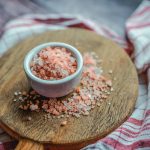Oh how I love to write about controversial nutrition topics. I think it’s so interesting that there are so many debates in the world of food, one of the hottest ones being whether or not to eat meat. Perhaps you have sworn off of meat for any number of reasons, or perhaps you know someone who has experienced numerous health benefits from removing animal products from their diet. Maybe you’ve even gotten into a heated debate with people over whether or not to eat meat.
The way I look at it is that it’s just not as black and white as to eat meat or not to eat meat. There are so many caveats to consider. There are lots of other blog posts that point out the merits of a vegan/vegetarian diet and those that claim you need to eat meat to be healthy. So I’m not going to regurgitate that information. There is also research that supports both sides of the argument. This article is more about my thoughts on the debate and what I tell my own clients.
Why Is it Always About Protein?
I’m sure every person who is vegan or vegetarian rolls their eyes when asked how they get their protein. Protein doesn’t come from just meat.
Protein is formed by amino acids and serves as the structural component of our muscles and tissues. Protein is needed to produce hormones, neurotransmitters, and enzymes. There are 20 amino acids necessary for growth and metabolism, 12 of which are non-essential, meaning that we do not need to eat them to make them. The rest, however, are essential and need to come from the food we eat.
When it comes to plant vs. animal, there are certain amino acids that are lacking in plants – lysine, methionine, and tryptophan tend to be deficient in plant sources. However, if you’re a savvy vegan/vegetarian, then you know that variety and food pairing are key (source). For instance, beans, even though they’re a great source of protein, are not a complete protein (they don’t have all of the essential amino acids). But when combined with rice, together the happy couple becomes a complete protein.
Meat, however, offers all of the essential amino acids. So eating meat guarantees that you will be getting all of the essential amino acids in the correct ratios the body prefers and needs to make protein. This isn’t to say that the vegan/vegetarian diet should be ditched, but that it just takes more intention when it comes to what we eat.
Some plant proteins might not be absorbed well due to anti-nutrients that can decrease protein absorption by up to 50%. Anti-nutrients are things like phytic acid, leptins and saponins which can be found in grains and seeds. These anti-nutrients can inhibit our body from absorbing minerals, vitamins, and even interfere with digestive enzymes, which help our body break down nutrients into usable parts.
Heme Iron vs. Non-heme Iron
Vegetarians/vegans can be at risk for iron deficiency. There are two types of iron, heme iron, which is found in meat and non-heme iron, which is found in plants. Heme iron is well absorbed whereas non-heme iron is not as well absorbed. In addition, phytates in plants inhibit non-heme iron absorption. Phytates in legumes and grains actually inhibit us from absorbing the iron, however we can take steps to decrease phytates, making the nutrients more available for absorption. Soaking and sprouting are two great ways to do this – if you soak and rinse your rice and beans over night, you are reducing the phytates. And then you can take it a step further by sprouting your grains and beans. I purchased a mesh sprouter that you can put on top of a mason jar for sprouting beans.
Soaking, sprouting and fermenting not only help us better absorb our nutrients, but also make our foods easier to digest.
Omega-3’s
Omega-3 fatty acids are lacking in the American diet. Conversely, we get plenty o’ those omega-6’s, found in inflammatory foods like vegetable oils. But Omega-3’s, found in fish, help decrease inflammation.
EPA and DHA are the beneficial components of our Omega-3 sources, and these are critical for our health. Vegans and vegetarians have a harder time getting these metabolites and a deficiency in them may be associated with depression, ADD, and Alzheimer’s. This is why fish oils are promoted for brain health, but they also support heart health and reduce inflammation.
The best sources of EPA and DHA in the amounts we need are from fish like krill, salmon, and cod liver. For vegans and vegetarians, an algae oil will provide EPA and DHA, but most likely in much smaller amounts. For vegetarians, eggs can also supply good amounts of DHA, which is especially important for brain health.
Vitamin B12
When people switch to a vegan or vegetarian diet, they may be missing out on a biggy: Vitamin B12 (Cobalamin). Vitamin B12 is an essential, water-soluble vitamin high in animal products such as meat, poultry, fish, and eggs. When we consume animal protein, vitamin B12 is transferred to our bodies via protein. While it is found in small amount in non-meat sources such as mushrooms and fermented foods, it is not high enough to meet the recommended daily amount (RDA). In addition to this, a B12 deficiency may not show up for a few years as B12 tends to be stored away in the body for a while.
B12 helps make DNA and assists in keeping our nerve and blood cells healthy. It prevents megaloblastic anemia, which results in weakness and fatigue. Not having enough B12 could cause fatigue, blurred vision, poor memory, depression, blindness, dementia, loss of appetite, and nervous system damage.
A good B12 supplement or a B complex is essential for vegans and vegetarians. Try to find a “co-enzyme” version, or methylated version, as these are preferred in case you have the genetic mutation, MTHFR, which requires methylated versions of B12 and folate.
It’s More About the Quality
Giving up meat is only part of the picture. If you’re familiar with the Netflix documentary, What the Health, they make a clear distinction between conventional animal protein and organic, free-range protein. It’s the conventional meat, farmed fish, and caged chickens that are making us sick – conventional meat is loaded with antibiotics, hormones, nitrates, and who knows what else. Conventional meat is also higher in those inflammatory omega-6 fatty acids. Not only that, but the animals are not treated well, are stressed out, and I truly believe that we are ingesting that energy.
If one is to give up conventional meat, then yes, one will feel better. Inflammation is likely to go down, the body is likely to heal, and symptoms may improve. However, the same could be said if one switches from conventional meat to organic, free-range, hormone-free and antibiotic-free meats. So it’s not really the “giving up” of meat that is key, it’s switching to quality sources (giving up the hormones and antibiotics, rather).
It Could Be the Dairy
If you feel better on a vegan diet, it could also stem from the removal of dairy. Dairy is highly inflammatory for many people, which can cause a lot of health issues. I recommend giving up dairy but not necessarily meat for many of my clients who have symptoms of inflammation.
The Moral Debate
I find there is a huge (and valid) moral debate about the treatment of animals when the decision is made to remove meat from one’s diet. However, there are many farms that treat animals respectfully, raising them in open fields, and feeding them quality food. Many farms open their doors for you to come for a visit to see how the animals live.
There’s also the environmental factor. Conventional animal farms are not only terrible places for animals, but they are terrible for the environment. This gives animal farming a bad rap overall. If we farm sustainably, we actually see that this is healthy for the soil and the environment. We may as a whole need to reduce our meat consumption, but we also need to start prioritizing farms that use sustainable practices to support the environment and health of animals and humans alike.
A Word About Hormones
Often, people who give up animal food sources tend to feel better and their inflammation goes down. This is a great scenario, however, many people find it is a short-term solution and a good way to transition their health to a better diet that suits them long-term. What I’ve seen in both my own practice and the research is that for some people, a long-term vegan diet can create blood sugar imbalances, weight gain, and hormonal imbalances. This can happen because vegan diets tend to be higher in carbohydrates, as common protein sources come from heavier carbs like quinoa, potatoes, tofu, beans, etc. Animal protein, on the other hand, provides the protein without the carbs.
As blood sugar begins to be disrupted, this can lead to other hormonal issues as well, such as disturbances in thyroid function, irregular and painful periods, hair loss, and more. This is not just related to an imbalance in blood sugar but a depletion in some of the nutrients discussed above.
Bio-individuality
At the end of the day, some people thrive on a vegan diet, and some people don’t. Making blanket statements doesn’t work because everyone is different. Not everyone believes in bio-individuality, which is the idea that there’s no “one size fits all” approach to health or way of eating. But when I see clients, I see everyone at a different stage of health. Everyone is a different size, age, ethnicity and genetic makeup. In addition, everyone has had a different upbringing. All of this plays a role in how we eat, absorb, and digest.
When it comes down to it, it’s up to each person to decide what works best for them. It’s not my job to force my beliefs on other people. It’s my job to educate clients and find what makes them feel nourished.
If you decide to be vegan or vegetarian, be diligent about the foods you eat and definitely get a good supplement regimen going to fill in any nutritional gaps. If you start showing any of the symptoms discussed in this article, it may be time to re-evaluate your nutritional needs. I’m happy to help and together we can work to find what nutrients your diet may need a boost in.
Photo by Fuzzy Rescue.




